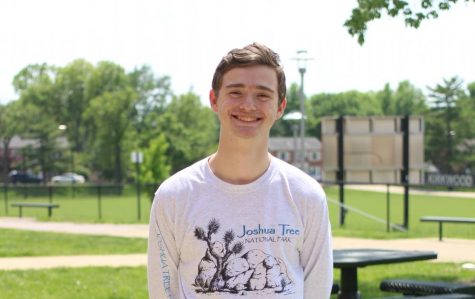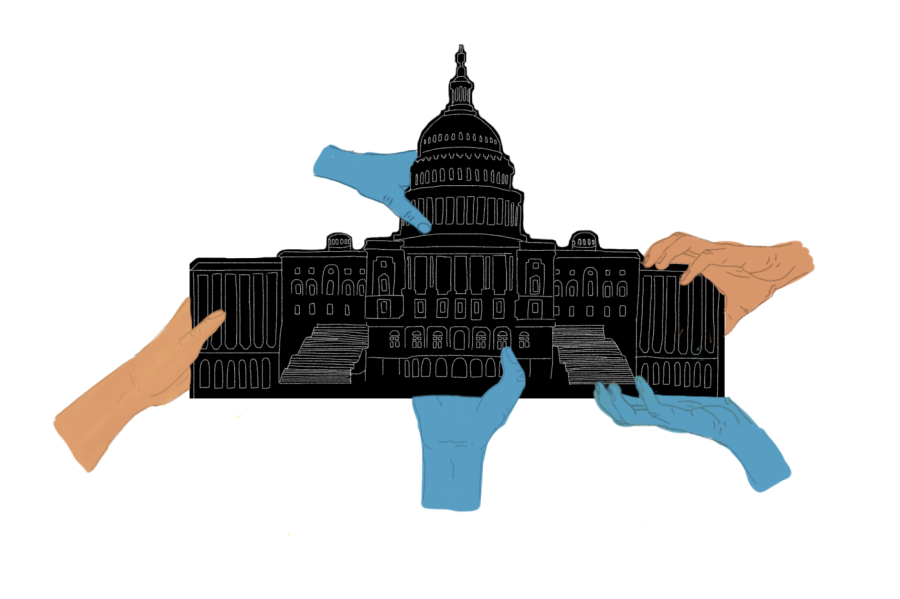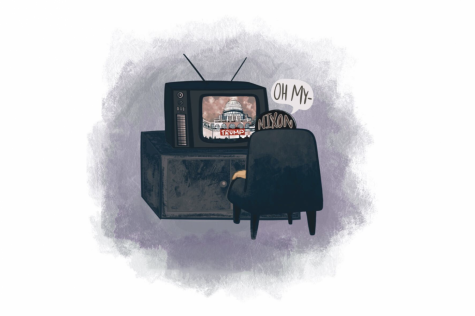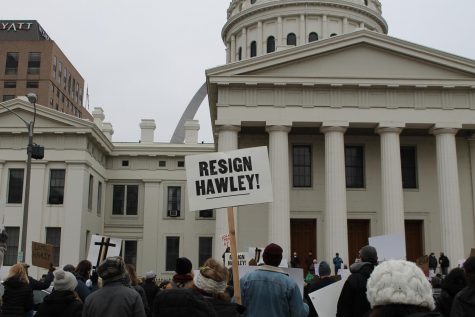Issues: The Midterms and why they matter
art by Thora Pearson
“This is the most important election in history.” According to Lucas Ravenscraft, AP United States Government and Politics teacher, this is one of those phrases that tends to get thrown around a lot, yet is hardly ever true. Why? Because according to Ravenscraft, to say that one election is more important than all the others diminishes the value of elections as a whole.
Because every election is important, he said.
On Nov. 6, the nation will head to the ballot boxes for one such election. Ravenscraft said the 2018 midterms have the potential to result in dramatic political changes with ramifications on all levels, from local to national. Yet Pew Research Center found that over 60 percent of Americans will not show up at the polls on election day. But according to many sources, there are countless reasons why they should.
The Missouri ballot will include two major motions that could have major implications for Missouri residents in the future, according to Kylie Rollings, junior. Voters will be able to decide if the minimum wage should be increased from $7.85 an hour to $8.60 an hour, with a provision to increase it by 60 cents every year until it reaches $12. In addition, voters will also have the opportunity to decide if Missouri will legalize the use of marijuana for medicinal purposes. Rollings stressed these measures will immediately affect anyone who is in high school, as well as all citizens in general.
“There’s so many things that people don’t think about,” Rollings said. “You should be thinking about what affects you most in life. Do decisions that are happening in other countries affect you immediately? Or is it how much money you’re making at work? What’s really affecting you? People need to realize just how important our local elections are.”
Liam Stros, senior, said 10 states with Democratic representatives in the U.S. Senate for midterm elections voted Trump in the 2016 presidential election, including Missouri, which makes these states especially unpredictable.
“It’s hard to indicate [who will win] by looking at yard signs in Missouri,” Stros said. “[Republicans] may just not be as vocal and tell everyone who they’re voting for.”
Although the course of the election remains unclear, ballots cast in the Missouri elections will have long-standing effects. On Nov. 6, the country will turn toward the “Show-Me State.” What will it have to show?
On a national level, ballots cast in swing states like West Virginia, North Dakota and Missouri are critical to this election. Republicans will either maintain their Congressional reign or forfeit their majority to the left. As of September 2018, Republicans have a 236-193 lead in the House of Representatives, and a slight 51-49 majority in the Senate.
In order for Democrats to paint the Capitol blue, they must keep all 193 seats in the House while flipping 25 seats. As for the Senate, out of the 33 seats open for regular election, Democrats must re-elect 25 Senate incumbents while also flipping three seats from Republican to Democrat. Those elected to the Senate will serve for six years. With this in mind, Ravenscraft said this year Democrats will have extra motivation to succeed.
“If Republicans control the House, the Senate and presidency, like they are now, they should be able to pass whatever they want,” Ravenscraft said.
All Republicans have to do is vote together and there is nothing Democrats can do to stop them.
And while this year’s Missouri elections could have large impacts across the board, the results of the national election could lead to decade’s long changes, according to Ravenscraft. He said there is a chance Republicans will lose their majority in the Senate, and the party that comes out on top will be able to confirm at least one justice to the Supreme Court in the coming years. And the next person on the court could affect, or even overturn, any number of major decisions, including Roe v. Wade and the legalization of gay marriage.
“[High schoolers] should be involved because of things like the Supreme Court,” Ravenscraft said. “Those are lifetime nominations. The people getting put on the Supreme Court now will be there for the next 30, 40 years. Just think about how much has changed in the last four decades.”
According to Deb Lavender, Congresswoman in the Missouri House of Representatives, none of these issues matter if people don’t show up to vote. 62 percent (228/366) of KHS students said they cared about politics. And of all KHS students, 73 percent (269/367) think their vote matters. According to Lavender, this couldn’t be further from the truth.
“Our nation was created through protest and revolution,” Lavender said. “We fought a war for our ability to govern ourselves. But over 50 percent of the people in this country didn’t vote in 2016. Do you think if all of those people had voted we would have different results? I do.”
Based on a recent survey, 83 percent (257/310) of KHS students were able to name a senator from Missouri, and 51 percent (149/295) could name their representative in the House. Ravenscraft said this lack of involvement from young people has contributed to an unhealthy relationship between the youth in America and their representatives.
“Politicians know who votes and who doesn’t,” Ravenscraft said. “So because young people vote at by far the lowest levels of anyone else in this country, politicians don’t pay attention to what young people say. It’s not because they’re young. It’s because they don’t vote.”
While politicians are supposed to represent the best interests of everyone, in reality they represent the interests of the people who show up to vote for them.
Rollings agrees, and said young people everywhere should go into these midterms with a will to change the relationship with young people and those in power. The only way to do that, she said, is by showing up and voting.
“It does matter what you think and how you vote,” Rollings said. “Maybe you don’t care about the future of the world, but if you have any interest in people beyond yourself living in a better society than we currently live in, then you have to at least try and get involved. If you want something to change, you can’t not vote. Because it does matter.
Your donation will support the student journalists of Kirkwood High School. Your contribution will allow us to purchase equipment and cover our annual website hosting costs.

Interests: Dancing for poms, writing for The Kirkwood Call, baking, reading + caving to my shopping addiction.
Favorite musical artist: J. Cole.
Favorite...

Interests: I try to write something new every day, and read a new book every week. Classical music is >>>>>> everything. I play piano,...

Interests: Running, drawing, governing + watching parks and rec.
Favorite musical artist: Cage The Elephant.
Favorite quote: "I couldn’t think...









